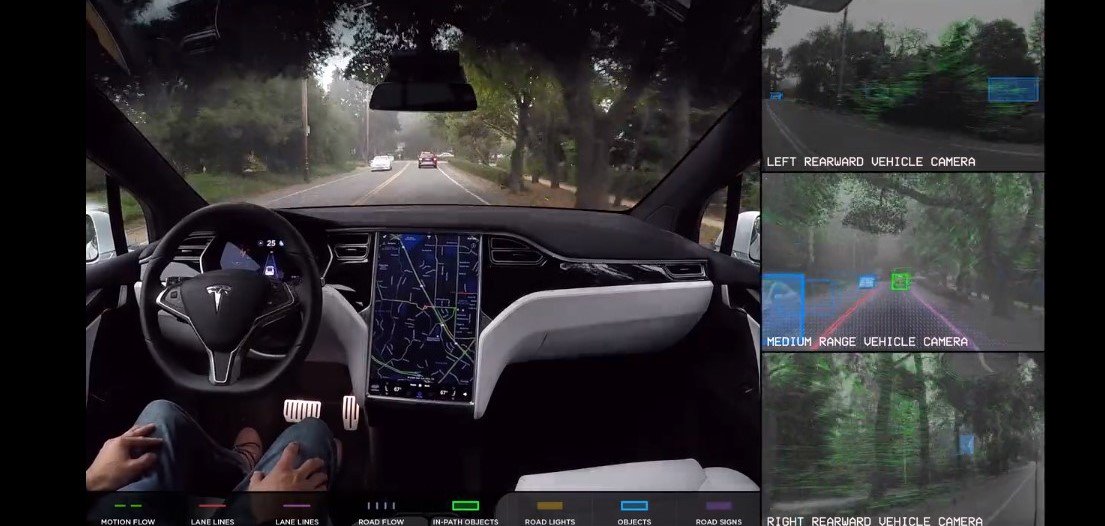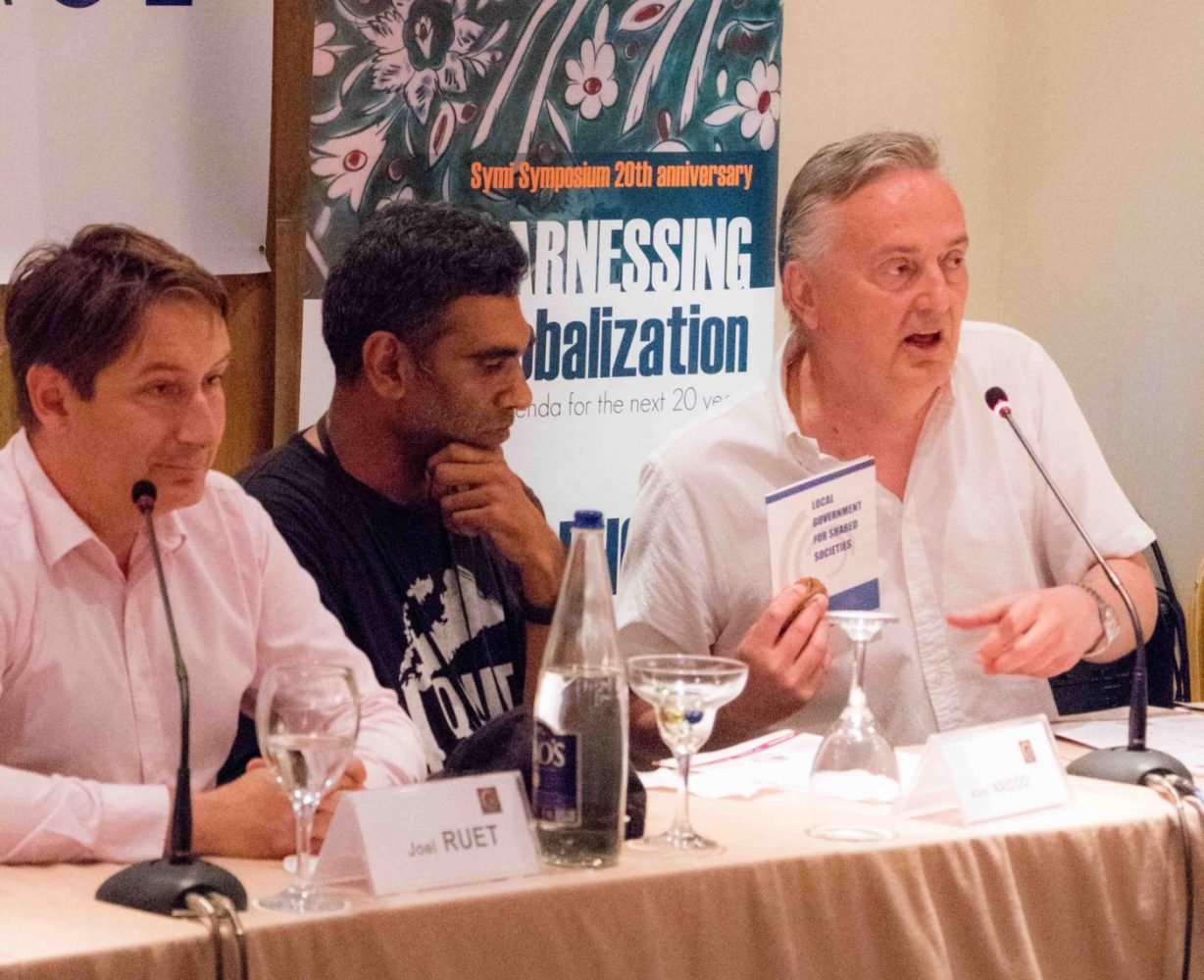
by BGF | Aug 6, 2018 | News
Tesla officially brought out its own computer chips for autonomous car. “We’ve been in semi-stealth mode on this basically for the last 2-3 years,” Musk said, “I think it’s probably time to let the cat out of the bag.”

They created their own hardware for machine learning. This gives Tesla a competitive advantage over creators that rely on available technologies, and distinguishes Tesla distinguished from other car-makers. Moreover, the new hardware would improve significantly over Nvidia’s hardware, and it can also be installed in older models.
Despite the convenience and safety brought by automated cars, there are also possible dangers if the technology is not adequately developed and tested. It is important as well to follow ethical standards, and this is the reason why MDI developed the AIWS 7-layer Model to ensure human safety when it comes to AI.

by BGF | Aug 6, 2018 | News
According to World Economic Forum, by collecting data, AI is making our choices easier and more convenient. Most of us welcome these advances, though in the near future, we might not be able to understand when AI is influencing our options. But here again, AI might be a solution.

Our lives now are controlled by data. It can help us remember and differerentiate what we want. AI is collecting data on us and recommending options that meet our demand based on our behaviours. For example, data on how we engage with our interests is collected and used to make suggestions. However, cnot only can companies know your behaviours but can also predict your interests, to the point where they may be able to influence the choices we make. This might result in us not knowing what we are looking for as AI is giving us options itself.
To tackle with this issue, we might need to use another kind of AI. This AI will not only know when we are being influenced, but also know the ways in which companies can leverage the micro-understanding of our behavior. This is a problem that needs further discussion, and MDI’s experts are working to create strategies and solutions.

by BGF | Aug 6, 2018 | News
In June 2018, in Israel Cyber Week, a large annual international cybersecurity conference, Mr. Bruce Schneier warned the delegates of a serious security problem regarding automated tech.

Mr. Bruce emphasized that there is the feasibility of integrity and availability attacks in healthcare and transportation. To be more specific, “What might happen if your pacemaker is hacked and it delivers a lethal charge, but what if I took over some inter-connected robot toy and tripped you in your house,” he asked.
He called for people’s awareness about the problems that we might encounter as technology is becoming autonomous. It is essential to enhance security so as to keep technology under control.
Mr. Bruce is an internationally renowned security technologist, named a “security guru” by The Economist. In 2015, he was honored by BGF as the Business Leader in the Cybersecurity for dedicating his career to the betterment of technology, security, privacy and Internet.

by BGF | Aug 6, 2018 | News
The Symi Symposium took place from July 1st to 4th, 2018, in Rodhes, focused on concepts and proposal of The Shared Societies.

World Leadership Alliance-Club de Madrid (WLA-CdM), which has been working closely with BGF and MDI in developing the AIWS 7-Layer Model to build the Next Generation Democracy, recently convened a symposium called the Symi Symposium. It is an annual meeting of leaders and experts by WLA-CdM. The issues of this year are some most pressing worldwide. One session was on Globalization and the Role of Shared Societies, chaired by South African Human Rights.
According to WLA- CdM’s report, the discussion demonstrated the significant relevance of Shared Societies in the world’s worry overglobalization which has inspired activist, nationalist’s movement on the idea of a Shared Society. In addition, the session came up with a concept of the Shared Societies, playing a role of a roadmap to sustainability in the future.

by BGF | Aug 6, 2018 | News
In June 2018, Prof. Jason Furman, Chairman of the Council of Economic Advisers of President Barack Obama, was invited to a talk at EmTech. “It’s where tech, business, and culture converge, and where you gain access to the most innovative people and companies in the world. It examines the most significant news on emerging technologies.” He discussed the situation of the labour force in the upcoming future as workers will be replaced with automated machines.

Furman discussed issues around the increasingly automated workforce—for example, whether machines are helping people earn more or whether they are acting as a substitute for our skills, such that people work less. When comes to the rise of AI, there are many possible outcomes in the realms of education, capital, wealth, etc.
It would be a waste of resources to try to predict the future that might happen and come up with a policy to deal with all the myriad possibilities. People should be working on policies for this moment to prepare for the future instead of only policies for AI. To be able to compete with machines, we could enhance skills which will be difficult to replace with AI—such as empathy, judgement, interpersonal relationships, and management.
In addition, in terms of developing a strategy for AI, ethical issues, cybersecurity and assuring machines are going to be for the good of human should be concerned. Overall, we need to prepare people to get into jobs and to be ready for the age of technological advancements.
Recently, Professor Jason Furman also took part in a conversation with Vietnamese CEOs in Vietnam CEO Summit 2018, discussing and recommending AI strategy for Vietnam’s economy. He became a member of MDI’s AIWS Standards and Practice Committee to contribute to the development of AI for good purposes.

by BGF | Jul 31, 2018 | News
On July 25, 2018 in Hanoi, Prof. Jason Furman – Harvard Kennedy School, Chairman of the Council of Economic Advisers of President Barack Obama and Mr. Nguyen Anh Tuan – Director of The Michael Dukakis Institute for Leadership and Innovation (MDI) presented their strategy for Vietnam to become a pioneer in the Age of AI.

The strategy includes specific measures for Vietnam such as: attracting funding from international organizations, nation-states, influential leaders; establishing AI-Governance; creating an AI Innovation Zone to produce advanced products and service for Vietnam and international markets; capitalizing on proximity to China’s, one of the world’s leading nations in AI,
This strategy embraces the ambitious goal for Vietnam to become an advanced leader in AI in Southeast Asia. There are still many obstacles, but if Vietnam is to become an advanced AI nation, they must be overcome.

by BGF | Jul 31, 2018 | News
Google has created Cirq, a software that lets developers create algorithms without needing a background in quantum physics.

According to MIT Technology Review’s article, quantum computers are at the beginning stage of this technology. In fact, it is a real challenge to program its circuits because of its distinct features. Instead of using standard digital bits which represent either 0 or 1, quantum computers are based on “qubits” which can be in both 0 and 1 due to superposition. Moreover, they remain in their delicate quantum state for no longer than the blink of an eye.
Cirq is an open-source initiative that allows programmers to access and modify its capability. Google created it based on TensorFlow open source which facilitates machine-learning software. Quantum algorithms can be created on simulators that can help build software that will run on a wide range of real machines in the future. Many other tech companies are taking this approach and developing initiatives to help developers build a code for quantum machines, but Google has put itself in the forefront of developing power quantum processors such as the Bristlecone chip, which hold the record for number of qubits.
Wit the current fast pace of technology, it should be kept in mind that the technology itself is not the achievement, what matters is how it benefits humankind.. It is necessary to have a certain set of moral standards in developing an advanced technology, the AIWS initiative with ethical standards in order to ensure every invention is for the benefit of humanity.

by BGF | Jul 31, 2018 | News
An international team of computer scientists, philosophers, religion scholars, and others is building computer models that can assist in carrying out experiments on policy making by creating virtual people to adopt with the policy.

In politics, it is difficult to tell whether a policy works out, when the decision is made. The only thing can be done is hope that it will be a success, if it isn’t, it cannot be undone. Now, the scenario is possible with the help of AI.
Over the past three years, Boston’s Center for Mind and Culture, and the Virginia Modeling, Analysis, and Simulation Center, as well as the University of Agder have been running a project on AI assessor. Experiments of religion-based policy are available with the Modeling Religion Project. It involves computer models populated with virtual people, or “agents”. The agents mimic the attributes and beliefs of a real country’s population by using data collected from that country.In addition, they are also trained on a set of social-science rules about how people tend to interact under various circumstances. The project gives politicians an assessment tool for policy making options in order to come up with the most decision.
Despite its usefulnes, it is the social problem the reserchers aim to deal with, as a mistake could lead to unintended consequence. It I, therefore, it is necessary to work on this with transparency and speak out about inherent ethical risks. This is in accordance with the first layer’s issue in the AIWS 7-layer model for AI ethical standards—its design and performance must be sufficiently transparent.

by BGF | Jul 31, 2018 | News
Collaborating with Pew Research Center and the IE School of International Relations, the WLA-CdM hosted an event where a finding of Pew Research Center was published on political attitudes in Western Europe.
In late 2017, a poll was conducted in eight countries of Western Europe; Germany, France, Italy, Spain, UK, Denmark, the Netherlands and Sweden. Where a trend toward disenchantment with politic was found. The poll underscored how populist parties are tapping into the frustration toward the establishment, according to WLA-CdM’s article, trust in democratic institution is low in countries such as the UK, Spain, France and Italy.


It can be seen that citizens with populist views didn’t perceive much economic benefit from being a member of the EU. The reasons for this is the increasing divergence between rural and urban environments, making it clear that democracies are not doing enough for many of their citizens, especially those who are behind in technology.
The WLA-CdM also plays the role of partner with BGF and MDI in developing the AIWS 7-layer model for AI’s development.


















